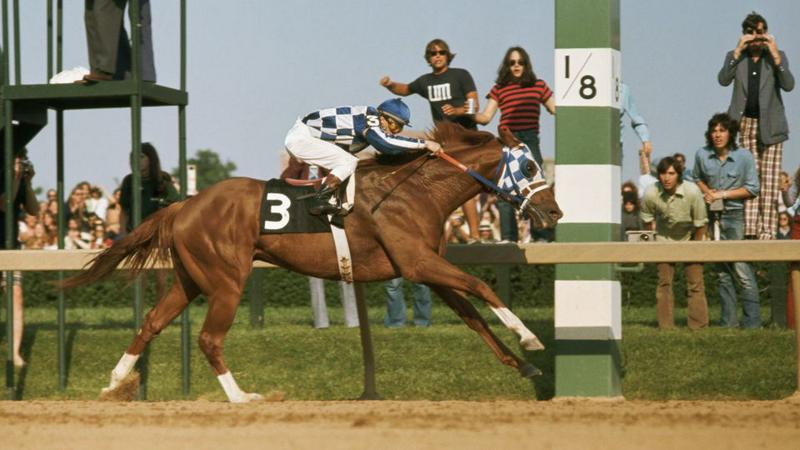The Greatest Race Horse Who Ever Lived: Secretariat
By | October 26, 2021
Outside of Pegasus and Mister Ed, Secretariat ranks as the most famous horse in history. Winner of 1973’s prestigious Triple Crown, Secretariat became the first horse in 25 years to win the Kentucky Derby, Preakness Stakes, and Belmont Stakes in the same year. Not only did “Big Red” win these illustrious races but dominated, seemingly setting records at every turn.

Secretariat’s superiority also occurred during a time when horse racing drew more attention than the NBA and perhaps even the NFL! Over 100,000 people flocked to Belmont Park near New York City to see if the extraordinary horse could rewrite history. This is the story of Secretariat.

From Good Stock
Like all racing horses, Secretariat came from a long line of equine speedsters. His father was Bold Ruler, the 1957 Preakness winner and his mother was Somethingroyal who hailed from a long line of horses bred for stamina. He grew to more than 16 hands and at two years old he reached the size of horses a year older.
Ironically, many handlers didn’t think much of Secretariat’s future. It was his owner, a woman named Penny Chenery who decided he was fit to race. Back then very few women were involved in racing but clearly, Ms. Chenery had a good eye. After coming in fourth during his first race, it looked like the handlers were right. However, that marked the only time in Secretariat’s incredible career when he finished off the podium.

Record-Setting Kentucky Derby
Eleven days after his debut he won a six-furlong race in Saratoga and quickly graduated to the big leagues. Over the course of 1972, the amazing thoroughbred won 7 of 9 races, setting him up for one of the biggest years in horse racing history in ‘73.
Two weeks before the Kentucky Derby, Secretariat came in third to “Angle Light” and “Sham.” At the Derby, he would face these horses again but this time he blew away the field. Breaking from the back of the pack, Secretariat blazed the remaining furloughs and set a record time of 1:59 and ⅖ seconds. He became the first horse to ever finish the 1 ¼ mile in under two minutes. Incredibly his record still stands today.

Preakness Controversy
Two weeks after the Derby, Secretariat won the Preakness at Pimlico Race Course in Baltimore. But coming out of the race, a time-keeping controversy swept the headlines. According to an “electric eye” called the Visumatic, Secretariat time was 1:55. That’s a solid time but not record-breaking.
However, multiple hand timers, used as backups, recorded “Big Red” at 1:53 2/5. When CBS devoted a half hour to the controversy, it became national news. After Secretariat won the final leg in the Triple Crown at the Belmont Stakes, did the Preakness adjust their time, giving the celebrated horse yet another record?

A Final Flourish
As over 100,000 people descended upon Belmont Park, the tension was incredibly high. As if sensing the moment, Secretariat delivered the most impressive performance of his career. Not only did he win but he shattered the existing record by nearly three seconds. He also decimated the field, winning by an outrageous 31 lengths. To cap it off his jockey, Ron Turcotte, said he lost control of Secretariat during the race and the horse barely noticed, sprinting into history on his own.
Over his astounding career, Secretariat set more records than races lost while earning $1.3 million over 21 starts. Adjusted for inflation that’s $7.7 million. To mark his greatness over 200 U.S streets were named after him. In 1999, ESPN ranked him 35th on the 100 greatest North American athletes of the 20th century. Even after his career, he garnered so much media attention he learned to pose for pictures.
He was euthanized in 1989 after contracting a severe hoof disease. During his autopsy, they found his heart to be 2.5 larger than the average horse. The performing surgeon, Dr. Thomas Swerczek, vividly remembered the day, “We just stood there in stunned silence. We couldn’t believe it. The heart was perfect. There were no problems with it. It was just this huge engine.” Traditionally, breeders only bury the head, heart, and hooves but Secretariat was given the honor of being buried in full.
